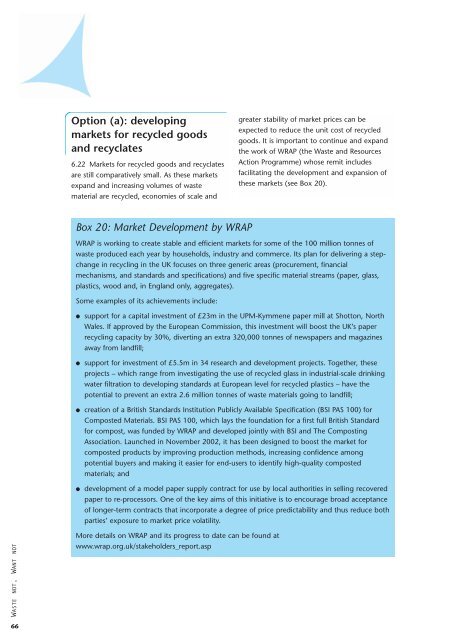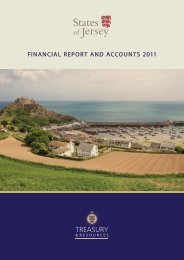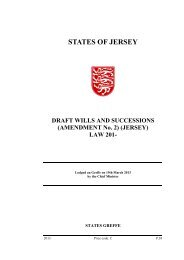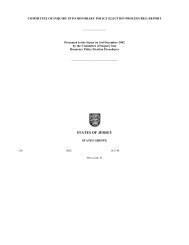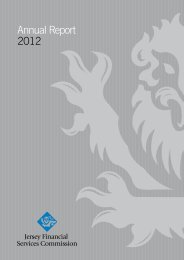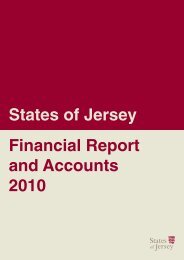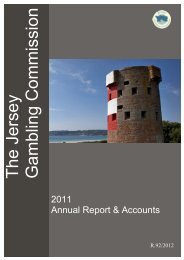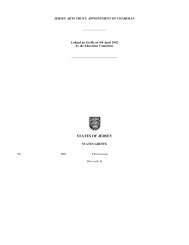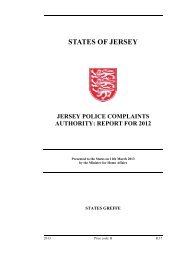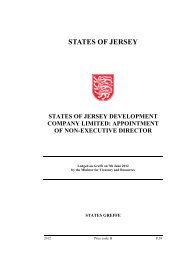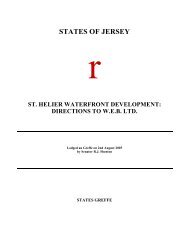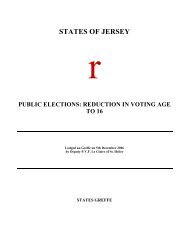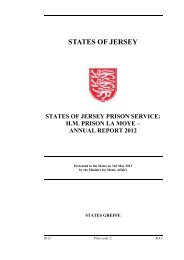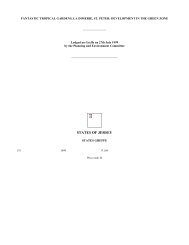Waste not want not - States Assembly
Waste not want not - States Assembly
Waste not want not - States Assembly
You also want an ePaper? Increase the reach of your titles
YUMPU automatically turns print PDFs into web optimized ePapers that Google loves.
Option (a): developing<br />
markets for recycled goods<br />
and recyclates<br />
6.22 Markets for recycled goods and recyclates<br />
are still comparatively small. As these markets<br />
expand and increasing volumes of waste<br />
material are recycled, economies of scale and<br />
greater stability of market prices can be<br />
expected to reduce the unit cost of recycled<br />
goods. It is important to continue and expand<br />
the work of WRAP (the <strong>Waste</strong> and Resources<br />
Action Programme) whose remit includes<br />
facilitating the development and expansion of<br />
these markets (see Box 20).<br />
Box 20: Market Development by WRAP<br />
WRAP is working to create stable and efficient markets for some of the 100 million tonnes of<br />
waste produced each year by households, industry and commerce. Its plan for delivering a stepchange<br />
in recycling in the UK focuses on three generic areas (procurement, financial<br />
mechanisms, and standards and specifications) and five specific material streams (paper, glass,<br />
plastics, wood and, in England only, aggregates).<br />
Some examples of its achievements include:<br />
●<br />
●<br />
●<br />
●<br />
support for a capital investment of £23m in the UPM-Kymmene paper mill at Shotton, North<br />
Wales. If approved by the European Commission, this investment will boost the UK’s paper<br />
recycling capacity by 30%, diverting an extra 320,000 tonnes of newspapers and magazines<br />
away from landfill;<br />
support for investment of £5.5m in 34 research and development projects. Together, these<br />
projects – which range from investigating the use of recycled glass in industrial-scale drinking<br />
water filtration to developing standards at European level for recycled plastics – have the<br />
potential to prevent an extra 2.6 million tonnes of waste materials going to landfill;<br />
creation of a British Standards Institution Publicly Available Specification (BSI PAS 100) for<br />
Composted Materials. BSI PAS 100, which lays the foundation for a first full British Standard<br />
for compost, was funded by WRAP and developed jointly with BSI and The Composting<br />
Association. Launched in November 2002, it has been designed to boost the market for<br />
composted products by improving production methods, increasing confidence among<br />
potential buyers and making it easier for end-users to identify high-quality composted<br />
materials; and<br />
development of a model paper supply contract for use by local authorities in selling recovered<br />
paper to re-processors. One of the key aims of this initiative is to encourage broad acceptance<br />
of longer-term contracts that incorporate a degree of price predictability and thus reduce both<br />
parties’ exposure to market price volatility.<br />
WASTE NOT, WANT NOT<br />
More details on WRAP and its progress to date can be found at<br />
www.wrap.org.uk/stakeholders_report.asp<br />
66


